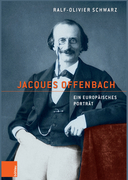The Jacques Offenbach Year: Clichés and Legends
Dr. Ralf-Olivier Schwarz
Wednesday, June 19, 2019

The following is a guest post by Dr. Ralf-Olivier Schwarz (Hochschule für Musik und Darstellende Kunst Frankfurt am Main), author of the new book Jacques Offenbach – ein europäisches Porträt (Böhlau: Köln and Wien, 2018). For the full post, please see the German version of this page.
The music world will celebrate a special event on 20 June 2019: the 200th birthday of Jacques Offenbach, perhaps one of the most important composers of the 19th century. One hopes that the Offenbach Year—the composer is being celebrated not only in his native Cologne, but also in Paris and many other places—will call into question the nice but distorted image that has guided Offenbach reception for decades. It is time to clear away the clichés and legends.
Materials from Offenbach’s estate are widely scattered. To this day, many historical documents are kept in private collections and are not accessible to the public. Only occasionally do individual autograph manuscripts, sketches, or other items from the estate appear at auctions—only to quickly disappear into another private collection again. Of course, a lot is to be found in public institutions, especially in the Bibliothèque nationale in Paris. Everything is far from having been “discovered” already: here, too, it is the case that the genres mineurs, which often include the “operetta,” or more precisely, Offenbach’s opéra-bouffe, have so far received little attention in terms of preservation.
A major exception, however, must be mentioned. After World War II, the Historic Archive in Cologne acquired several important private collections and thus began building up an important Offenbach collection, indispensable for researchers. If it hadn’t been so tragic, one could have called the collapse of this magnificent archive in March 2009 a coup de théâtre straight out of an Offenbach opera. For here we had not only superb first editions and libretti, but also Offenbach’s massive body of correspondence, countless sketches, and not least of all hitherto overlooked works awaiting scholarly examination. Despite this, we have some good news for the 2019 Offenbach Year: Only ten years after the collapse of the city archives, the vast majority of the Offenbach collection has been preserved—and is accessible again! Offenbach research is taking its course, with some recent musicological and historical studies on the work of the Cologne composer, with several international scholarly symposia in 2018 and 2019. These activities show a new interest in Offenbach, particularly in that he is more visible, especially in his hometown of Cologne. There is still much to do from the scholarly side, but a start has been made.
Share Tweet EmailCategory: Musical anniversaries

